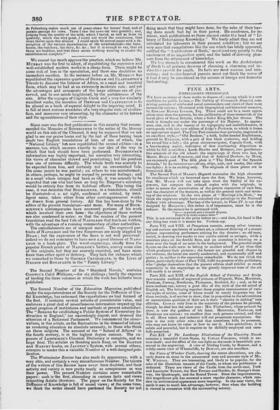. Since ours was the first publication in this country
that recom- mended the Memoirs of BOURRIENNE to the notice of the literary world on this side of the Channel, it may be supposed that we are glad to see our praise borne out by the fact of there having been made two English translations of him, of one of which, the "National Library" ha's now republished the second edition—in a manner, too, which answers exactly to our idea of the way in which that task should have been performed. BOURRIENNE'S information was highly important, his narrative very interesting, his views of character shrewd and penetrating; but his position was one of extreme difficulty. The whole truth was scarcely to be expected from him, and certainly not an unvarnished tale. On some points he was partial ; on others he was misinformed ; in others, perhaps, he might be warped by personal feelings ; and in a court where intrigue had been so rife, it was scarcely to be expected that one who had been so long the Emperor's secretary would be entirely free from its habitual effects. This being the case, it was desirable that BOURRIENNE, in a translation, should be illustrated—i. e. set right, confirmed • or refuted, by intel- ligent notes, taken either from other contemporaneous works or drawn from general history. All this has been done by the editor of the present translation—and more. For many of BOUR- EIENNE'S contemporaries have answered portions of his work which involved their own fame : the objections of these writers are also condensed in notes : so that the readers of the present translation read the best Life of NAPOLEON that has been written, with the advantage of a running commentary of other authorities. The embellishments are of unequal merit. The engraved por- traits of NAPOLEON and the two Empresses are nicely stippled by DEAN; but the expression of the faces is not well preserved : indeed we do not remember to have seen a good likeness of NAPO- LEON in a book-plate. The wood-engravings, chiefly from the popular French prints of NAPOLEON'S battles, convey some idea of the originals, but they are coarsely executed, and have more force than either spirit or delicacy. They lack the richness which we remarked in those by GEORGE CRUIRSHANK, in the Lives of NELSON and BONAPARTE in the" Family Library."


























 Previous page
Previous page